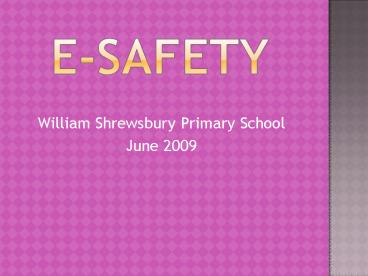ESafety - PowerPoint PPT Presentation
1 / 18
Title: ESafety
1
E-Safety
- William Shrewsbury Primary School
- June 2009
2
Wheres klaus?
Please click on the link and watch this video
3
Aims of the presentation
- Make parents more aware of the e-Safety
procedures and syllabus in school. - What the e-safety issues are
- Various ways children and young people are
accessing the Internet - Offer guidance and ideas on keeping children safe
Respond to the negative
Promote the positive
4
Where are we now?
- William Shrewsbury currently has
- Internet Safety and Acceptable Use Policy for
pupil use and staff use - Curriculum ICT policy which incorporates E-safety
schemes of work for both Key Stages - Filtering system which blocks inappropriate
content. - Reporting Procedures in place Hector,
SuperClubsPlus and Report Abuse buttons
5
Why be concerned about e-safety?
The Every Child Matters states that each child is
entitled to
- Be healthy
- Stay safe
- Enjoy and achieve
- Make a positive contribution
- Achieve economic well-being
- Schools have a duty of care to uphold ECM.
6
Why do we and our young people use ICT?
Accessed anywhere anytime
A key skill for life
Wide and flexible range of information
Easy to communicate with friends and family
Motivational and fun
ICT
Raise standards
Presentation
7
How do we use these technologies?
- Young people
- Music
- Games
- Chat
- Instant Messaging (IM)
- Blogs
- Social Networking
- Adults
- Shopping
- Booking holidays
- Research
8
In School Outside school
?
- Supervised
- Monitored
- Filtered
- Curriculum
What are you doing at home?
81 of parents think they know what their
children are doing all or most of the time when
accessing the internet (UK Children Go
Online) however our school survey shows that they
are accessing sites that you would be unlikely to
let them view.
9
Scary School Stats
- A recent survey of William Shrewsburys 7-11 year
olds found - 86 of our kids play games online
- 54 visit chatrooms 14 of 5-7 year olds
- 100 have sent an email
- Most children own their own mobile phones
- 66 upload photographs and videos onto the net
(bebo, youtube and Superclubs) - Staggeringly though, only 8 of 5-11 years olds
at our school, knew of any computer based or
discussed restrictions/rules on the use of the
internet at home. - Usage and experiences are often not reported
- to parents/teachers as they fear their access
will be restricted.
10
This is what was shown to your children in a KS2
e-safety assembly
Click on the picture to follow the link
11
SMART rules in school, why not use them at home?
SAFE Keep safe by being careful not to give out
personal information to people who you dont
trust online.
MEETING Meeting up with someone you have only
been in touch with online can be dangerous. Only
do so with your parents/carers permission and
even then only when they can be present.
ACCEPTING Accepting e-mails, IM messages or
opening files from people you dont know can be
dangerous they may contain viruses or nasty
messages!
RELIABLE Someone online may be lying about who
they are, and information you find on the
internet may not be true.
TELL Tell your parent/carer or teacher if
someone or something makes you feel uncomfortable
or worried.
12
Some sites for internet safety guidance and
security
Visit Hectors world to download Hector the
Protector to block unwanted content.
www.superclubsplus.co.uk
13
e-safety
- Report to the police if you find evidence of
- - indecent images of children
- - incidents of 'grooming' behaviour
- - the sending of obscene materials to a child
- Should any of these be discovered CEOP advice is
to turn off the screen, secure themachine (lock
away) and contact the police for further
instructions. - Do not shut down the system using Windows
Shutdown (pulling the power plug or removing the
battery is OK). - Do not use screen capture to keep evidence good
intentions can fall foul of the law relating to
making an image.
14
Potential risks
- Inaccurate and harmful
- Adult content
- Illegal content
- Inappropriate contact
- Cyberbullying
- Sex offenders
- Privacy
- Advertising information
- Invasive software
- 73 of online adverts are not clearly labelled
making it difficult for children and adults to
recognise them - 57 of 9-19 yr olds have come into contact with
online pornography accidentally. - 4 in 10 pupils aged 9-19 trust most of the
information on the internet. - 1/3 of young people have received unwanted sexual
or nasty comments online. Only 7 of parents
think their child has received such comments.
15
http//tcs.cybertipline.com/videos.htm
16
Concerns are shifting from what children are
downloading in terms of content to what they
are uploading to the net.
It might be funny to you and your friends, but
remember that anyone can see it and it will never
be deleted.
17
and finally remember
..the risks do not merit a moral panic, and nor
do they warrant seriously restricting childrens
internet use because this would deny them the
many benefits of the internet. Indeed, there are
real costs to lacking internet access or
sufficient skills to use it.
However, the risks are nonetheless widespread,
they are experienced by many children as worrying
or problematic, and they do warrant serious
intervention by government, educators, industry
and parents. video
http//www.children-go-online.net/
18
If you would like to view our internet policy,
please ask at the school office.































